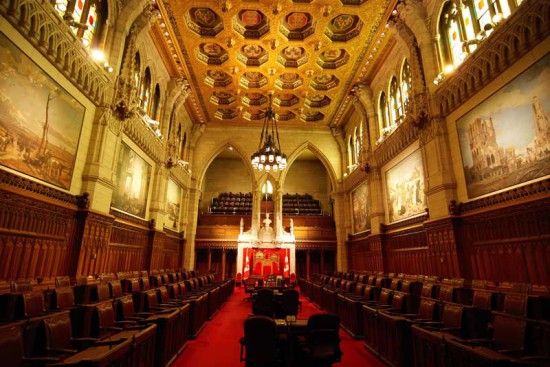The Canadian Senate has been much in the news lately as various members of the red chamber are being investigated for various possible offences and, in the one notable case, a senator has been removed from attending meetings (although he’s still collecting a paycheque) after being charged with assault and sexual assault.
This has refueled a national debate on the usefulness of the Senate at all or whether an elected Senate would be more accountable.
In all of this chatter that arises from what will in likelihood prove to be a few bad apples, the primary purpose of the Senate is being overlooked.
There are a few other realities that are also being overlooked and chief among these is the fact that a senator, while he or she is appointed to the office by the party forming the government in the House of Commons at the time, is expected to be non partisan in their Senate activities.
Sadly, this has not proven to be the case in recent times, most notably among at least some of the Senate appointments made by the current governing Conservative government.
Most of the recent Conservative appointees appear to take it as their job to carry the Stephen Harper Conservative banner in the Senate and to not question, but support and augment, if possible, any government bills that they are asked to oversee.
The fact is, in an ideal world, the chamber of “sober second thought” would be populated by bright, enquiring minds and not by political hacks.
Senators often take the lead on large research projects that may eventually influence public policy. Examples of these, although they are not recent, are the late Senator David Kroll’s Royal Commission on Poverty and the late Senator Keith Davey’s Royal Commission on Concentration in the Media.
These two are cited as examples because they each became part of the national debate on their respective topics when they were tabled about 40 years ago.
There have been many more such Royal Commissions undertaken by senators since then, acting in the capacity in which we would like to see them: as good citizens of this country, acting not particularly on behalf of a political point of view but rather for the benefit of all Canadians.
There are enough of the current crop of recently appointed senators who appear to see it as their main job to defend the favourite policies of the powering Tories no matter what.
Doubtless that isn’t a problem for them because of their strongly held political opinions.
But this shouldn’t be their role.
The Senate exists in Canada to ensure that the bills sent to them by the government of the day are in line with precedents set by previous legislation, which proposed federal legislation is consistent with provincial regulations and that they are also in line with the Canadian constitution.
All of this, of course, is in addition to the important original research that Senators should be able to take on.
An elected Senate is simply a ludicrous idea: we already have an elected body in the House of Commons that represents Canada very well. Another elected house, similar to that of the U.S.?
Our two countries’ legislative history, although both have their roots in British parliamentary democracy, differ quite fundamentally as the U.S. Senate, with just over 100 elected members, holds as much or more political clout than the much larger House of Representatives and if we begin electing senators in Canada, there will certainly be an expectation that this group will also acquire legislative authority.
The possible, even probable result is a legislative gridlock when different parties control each house. Under that scenario nothing tends to get done without a clear and imminent crisis to force compromises. Why would we ever want to put ourselves in a position like that?
The Senate, if the right kinds of people are appointed, should be doing the important work for Canadians for which the organization was established at the time of Confederation and doing this work in a non-partisan way.
If a government bill is inappropriate to Canada’s needs, the senators, no matter what their political bias, should be able to say so and, in so doing, some of them will be no doubt disagreeing with the government that appointed them.
This does not seem to be happening these days on any important matters and Canadians should be demanding more that Senators act in the way we have traditionally found them useful.
More importantly, we should express this concern to the government in Ottawa and tell all sides in the House of Commons that the members of the Senate have a far more important role than to waste their time supporting or opposing the government of the day. They must be above all of that.
It this proves an impossible task then the abolishment of the entire endeavour would be in order with the senator’s important work handed off to the House of Commons committees.





